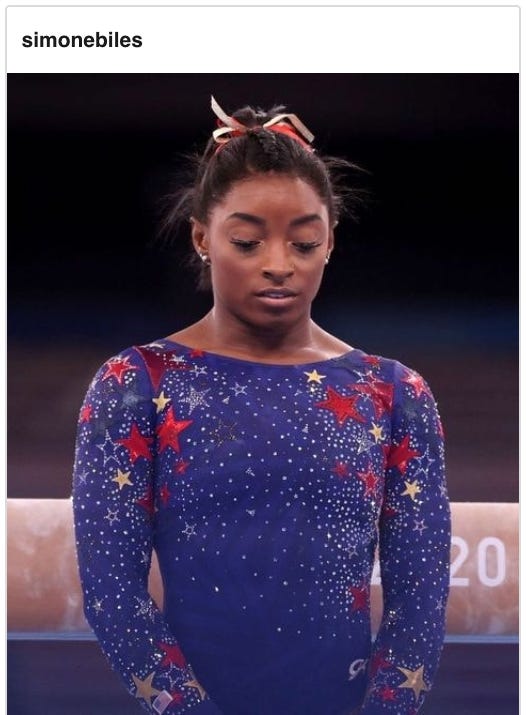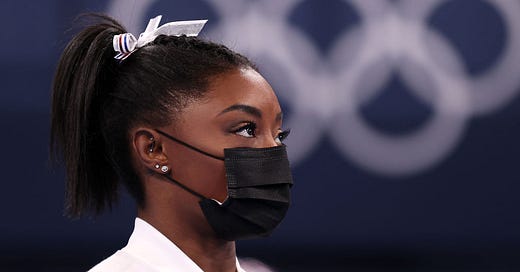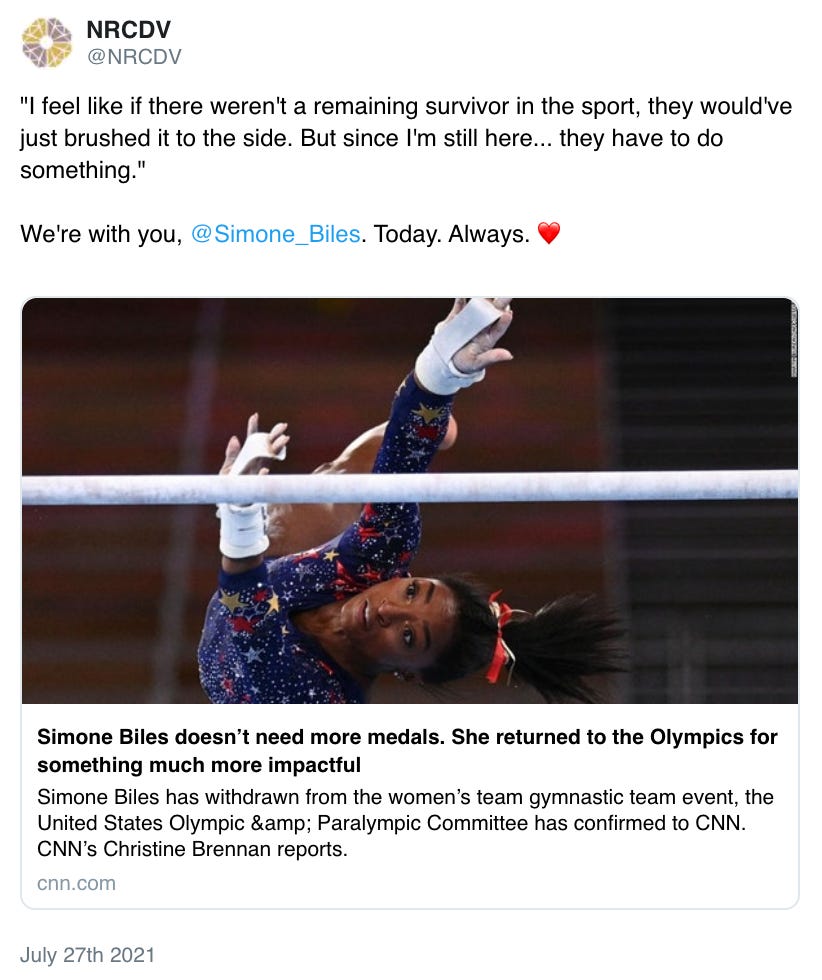The newscycle speeds by and often there is no time to pause and reflect. Yesterday can seem like a lifetime ago. A week? I suspect you know what I’m talking about. The pandemic has only exacerbated the fogginess of time. And for those of us on social media, the scrolling further warps our internal clocks.
With this in mind, I wanted to look back at the Olympics for a moment, now that they have ended. I remember when the Games dominated public attention, and they were proxies for Cold War showdowns. Today, with all that is happening in the world, with the ability to know results instanously, with clips streaming, and storylines merging, we are in a different era. Whether the modern version of the Olympic Games should continue, and if so in what form, is a topic for a much broader discussion. But still for many, these moments of athletic and personal achievement capture the imagination.
And that brings me to Simone Biles.
Over the course of my lifetime, I’ve seen courage in many forms. I’ve seen it on the battlefield. I’ve seen it at lunch counters. I’ve seen it on picket lines. And I’ve even seen it on occasion in the halls of Congress. A favorite definition of courage I like to share is being afraid and going on anyhow. But what does it mean to “go on?” Is it simply an action or is it a larger concept of forging ahead in the face of adversity?
For anyone who has seen the highlights of Biles defying gravity and the seeming limitations of the human body, of her ability to twist, turn, flip, and land with power and grace, there should be no question that she has the rare courage that comes from the mixture of youth and athleticism. But there is a lot more to the Biles story. Not only is she an Olympic champion and acclaimed as the best gymnast to ever live, she is also an African-American in a country with a fraught relationship to race, a trailblazer within a predominantly white sport, a survivor within an organization that failed to protect its athletes, and quite simply, a human being navigating her 20s in and out of the spotlight. Any one of these categories has its challenges (and deserves its recognition.) Yet, the crossroads of life brought Biles to the intersection of them all.

Going into the Games, NBC Sports and much of the national press focused on Biles as the face of these Olympics. The question was not if she would win gold, but how many golds. You heard a lot of some version of “there’s no sure thing in sports, but...” And then the but happened. During the first round of the team competition something seemed off. But we had no idea how off it was.
Soon the headlines out of Tokyo were of a stunning turn. Biles was withdrawing, first from the finals of the team competition, then from other events. As could be expected, this development ricocheted across the airwaves and social media. Everyone had a take. There were the critics of course, many of whose comments reeked of double standards (especially when you consider Biles’s race). And then there was the pushback. The cheers for her courage in coming forward and admitting that the problem wasn’t in a ligament or muscle, but in her mind. A debate then ensued about athletes and mental health.
We soon learned Biles was dealing with a dreaded case of “the twisties” — a term new to most of us but apparently well known with horror among fellow gymnasts. If you fly through the air and risk breaking your neck, it sure helps to know where you are, what’s up and what’s down. Without her usual mental focus, Biles lost that sense. How terrifying that must be. Biles makes her gymnastics moves look easy, but there is of course nothing simple about them. Proof of that lies in the fact that some of the feats she performs are named after her, because she was the first gymnast in history to do them.
I couldn’t help but feel great empathy for Biles. You don’t dedicate all that time, effort, and sacrifice, you don’t risk so much physically and emotionally, if you don’t have a deep drive to compete. But think of all the other factors crashing in about her — the stress and distraction of the pandemic, the extra year of training due to the delay of the Olympic Games, the burden of expectation to perform, and an untimely passing of her aunt. Then there is the specter of Larry Nassar, the former USA Gymnastics team doctor who sexually abused hundreds of athletes. Biles was also a victim. And it is worth noting that part of what drove her to compete in Tokyo was to ensure that at least one publicly-known survivor would remain in competition. She wanted this story to be part of the Olympic story. She spoke about it. She highlighted it. She refused to let those responsible for not protecting young women get away with their actions. Once again, that in my book is courage.
How much can we expect from our Olympic athletes? How much can we expect from a 24 year old? These questions are not to denigrate extraordinary talent and ability but rather to highlight the humanity that is at the heart of sports, like it is at the heart of all life. What support do we owe to those who consistently perform and deliver for us? Are we big enough to support someone’s needs even at the cost of something we want from them?
We cannot look at a young Black woman athlete in 2021 and ignore all the context and history. In this country, labor, performance, and capital have come with varying degrees of human cost. It is a statement of fact that that cost has been inordinately borne by those of African-American heritage. Their humanity has often been reduced to a literal definition of labor. Women also have seen their labor undervalued and exploited. Over the course of American history Black women have been particularly devalued. They have been portrayed less as individuals than as tropes, often ones that are contradictory: strong, and lazy, able to accomplish superhuman feats, and needing someone to take care of them. You can see this in movies and other forms of popular culture. And you can see this in the tinged language (and sometimes not-so-tinged language) used by politicians and media figures. Nevermind that Black women have time and time again helped push this nation to a better version of itself, in workplaces, in social justice movements, and at the ballot box.
Whether she asked for it or not, all of this is also part of the Simone Biles story. Before she ever competed, before America ever fell in love with her, before some in this country then questioned her resolve and character, she knew instinctively that she would face tests that her other peers and competitors would not. Rather than shy away from this legacy, she has embraced her truth and developed the power of her voice. That she has owned her excellence (the Greatest Of All Time), is again a testimony to her courage.
I remain hopeful that this latest chapter in Simone Biles’s young life will be one that helps make this nation better. I applaud her bravery in doing what she needed to do, for her health, when the spotlight was greatest. It was an act of strength. This is especially true in a sport, a society, and a world that too often prioritizes self-sacrifice and stigmatizes mental health and well-being.
To all those who have criticized Biles as weak for withdrawing from events, I ask, how should we treat each other in times of need? Are we quick to criticize or do we lead with compassion and empathy? Biles is not the only one suffering today. In ways large and small, everyone has been affected by this pandemic. The stress on those who already struggle with mental illness has been particularly strong. What does it mean to win? Should it be measured in gold medals or even election results? Or should it be measured in our health and happiness, our sense of community and a common humanity? Many of the most memorable Olympic memories over the years have been feats of sportsmanship and not just strength and speed. Yes, winning is nice. We can cheer on our favorite teams and athletes. But when a narrow definition of winning drowns out the larger tallies of life goals, we are all in a sense losing something precious.
Simone Biles forced us to pause to think about sports and life, at least for a moment, through a different lens. And for that we should all be thankful. If she has courage to stand up, we should have the courage to stand with her. I don’t know where Biles’s story goes from here, but I suspect it will be one of continuing courage. She has changed gymnastics forever, not only in what athletes can do but the diversity of those who were inspired to follow in her footsteps.
There was one last hurrah in Tokyo — a triumphant return to form on the balance beam and a bronze medal. It must have felt golden. Then Biles got a hero’s reception when she landed back in her home state of Texas. If there’s anything I know, it’s that you can’t underestimate a woman from Texas. No matter what you think is tough, they’ve seen and been through tougher. Welcome back, Simone. We are proud of you. Good luck and Godspeed as you move forward. Courage.
I hope to continue to build a community here on Steady. If you aren’t already a subscriber, please consider signing up to a free or paid subscription. You can also leave a one-time tip to support our work. And if you are already part of our family, please consider sharing this post — and Steady — with others.









The more I read Dan Rather, the more I love the "United States of America" he represents. The way we envision our world is the world we endeavor to create. If we choose to live in love and all that it encompasses, we choose to actively support life, liberty, and justice in our daily actions. We choose to support the progressive movement of life in this wonderful and every changing universe. If that is not worth getting up for and participating in, I don't know what is. I can say with confidence, this country is deeply honored by Simone Biles.
Before the Olympics started I told my teen daughters there was no way for Simone to exceed expectations. If she won all gold, performed new moves, set records - she would just meet expectations. Expectations were that high. It was almost sad -- amazing feats & success just to "meet expectations." In her darkest hour, when Simone withdrew & yet returned to put all her energy into cheering for her team, my 13 yr old turned to me & said, "you were wrong mom. She found a way to exceed our expectations." ❤